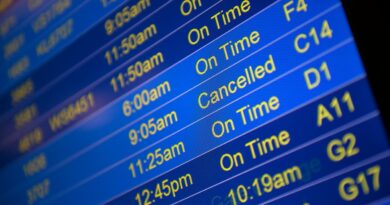Your best strategy if your British Airways flight is cancelled
Your support helps us to tell the story
As your White House correspondent, I ask the tough questions and seek the answers that matter.
Your support enables me to be in the room, pressing for transparency and accountability. Without your contributions, we wouldn’t have the resources to challenge those in power.
Your donation makes it possible for us to keep doing this important work, keeping you informed every step of the way to the November election
Andrew Feinberg
White House Correspondent
Cristo Foufas is a man with a mission. The broadcaster has a Sunday morning programme to present from the TalkTV studio in London. So when he was invited to a wedding in Barcelona taking place on Friday, he made sure to book a British Airways flight that would get him back to Heathrow in good time on Saturday. But like 25,000 other passengers on BA this weekend, his flight was cancelled at short notice.
British Airways blames bad weather for the grounding of more than 100 departures and arrivals on Friday, with many more on Saturday – including Cristo’s – cancelled in response to a reduction in the “flow rate” of arrivals.
BA holds the majority of precious landing and take-off slots at London Heathrow, the busiest two-runway airport in the world. If there is disruption at LHR, European airlines can cope very easily: for Air France, KLM and Lufthansa, Heathrow operations are only a small part of the operation.
But when things kick off at the British Airways main base, 100 per cent of its flights are potentially affected. So the carrier is bound to be more susceptible to disruption at Heathrow than anyone else – as it proved on Saturday.
At least 60 domestic and European flights were cancelled, all of them by BA. Given the vulnerability, how British Airways responds is crucial.
I can easily state Cristo’s rights under European air passengers’ rights rules: he should immediately be offered a flight the same day, with meals provided until he can get on his way. Should an overnight stay be necessary, the airline is responsible for finding and providing accommodation for him in the Catalan capital. Curiously, BA failed in both respects. The airline rebooked him on a Sunday flight that would get him to London long after his show had finished and neglected to add: “We recognise you’re away from home, so we’ve booked you a hotel.”
An overnight stay was irrelevant. “I’ve now booked with easyJet instead as the flight BA offered wouldn’t get me home in time for my TalkTV show,” he told me from Barcelona. EasyJet came up with a seat, dynamically priced at £300 – almost as much as he had paid for the original British Airways return ticket. Cristo will be able to claim the difference back from BA. But why should he have to bother?
The answer comes down to two factors: complexity and complacency.
- Complexity: the two most obvious alternatives to British Airways are easyJet and Ryanair. BA can delve into the reservations systems for “legacy” carriers such as KLM and Lufthansa and find replacement flights for stranded passengers, often involving connections in Amsterdam, Frankfurt or Munich. But neither of the big low-cost airlines has any interest in opening up their inventory to other carriers – figuring, probably correctly, that they will Hoover up distressed passengers anyway. British Airways could in theory set up an operation to find alternative flights manually for stranded travellers. But since during this dose of disruption average “hold times” on the phone lines were close to an hour, the chances of BA funding hundreds more staff to deal with the odd bout of disruption looks slim.
- Complacency: All the UK airlines know that the Civil Aviation Authority (CAA) is unlikely to take action if they fail in their obligation to provide the “best fit” replacement for a cancelled flight. The CAA has robustly rapped the knuckles of Wizz Air, but that was for failing to deal properly with the “pay and reclaim” process – leaving some passengers many hundreds of pounds out of pocket. But the aviation regulator looks content to allow airlines to shrug off their duty of care, so long as they eventually stump up for the costs of self-service rescue.
So where does that leave Cristo? Cheesed off. “I’m incredibly frustrated with BA,” he says. “I book our national carrier as there’s a perception it’s reliable – but all too often now there are delays, cancellations and no one on hand to help.”
At least now you know the ground rules if you’re grounded. Just make sure that credit card has plenty of headroom.
Simon Calder, also known as The Man Who Pays His Way, has been writing about travel for The Independent since 1994. In his weekly opinion column, he explores a key travel issue – and what it means for you.




